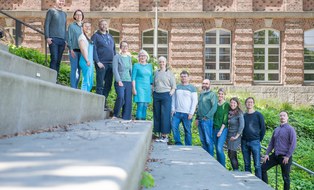Tips for Choosing the Right Study Program
Table of contents
Choosing a degree program involves a variety of aspects and certain key questions. The video, the radio program, the checklist and the following tips can help you find your way and choose the right degree programme.
Checklist for choosing a degree program
Hello, I'm Sylvia and I've just finished my A-levels. Now it's time for me to start thinking about my studies. In my vlog, I'll take you with me to various courses offered by TU Dresden. © Dresden University of Technology
- Have you completed an internship?
- Have you interviewed someone from my desired profession?
- Did you do the research on the Internet to find suitable degree programs?
- Have you participated in lectures?
- Did you get a first overview of the contents and requirements of my desired studies? Did you get information on admission requirements and application modalities?
- Did you compare the contents of the degree programs with my interests (see study schedule and module handbook)?
- Have you spoken to students, for example from the Faculty Students' Council?
- Did you speak to friends and parents?
- Did you discussed pros and cons with professional student counseling?
- Have you taken a field of study related test at the Job Centre (Agentur für Arbeit)?
- Have you completed a self-assessment test? Examples:
- Have you done research on interesting occupational fields and professions? Examples:
Tips for choosing a degree program
Advantage of diversity or lost in the jungle of offers? Our student counselor Cornelia Blum was a guest on Deutschlandfunk's “Campus & Karriere” program. Have a listen!
Aspects to consider when choosing a degree program
- Time – Do I study right after school or later?
- Location – Do I stay at or near my home town or do I go further away to study?
- Type of higher education institution – Do I study at a university of applied science or at a university?
- Degree – Which degree do I want to achieve?
Which is the right degree program for me?
You have enjoyed certain subjects at school, you have seen your parents' and other adults' work, you hear what your friends want to study, and you may have had some first experiences in one or more professional fields. Some things come easy to you, some are a bit more difficult, you have an idea of what women and men choose for their professions. Parents and friends encourage or discourage you to choose certain subjects and sometimes you hear the question: 'What are you going to do with that later?' It is not easy to come to a decision. While some prospective students have had very specific ideas about what they want to study for years, for most of them this question is not easy to answer.
Steps of decision making – what is important?
It makes sense to start from your ideas about your professional future: What would you like to be involved with in the future? Which topics are of interest to you? How do you imagine your future life and how important should your professional activity be in your life?
Based on these ideas, you can specifically look for information to find out which degree programs might be an option for you. Ideally, a study decision combines the preparation for a career with the wish for personal development and education. Talking to experts in the respective field of work or with students of the subject can be helpful to find out whether your expectations match reality. An excellent possibility to test the reality is to do an internship in the field of work you are dreaming of. You will get a lot of information, see the employees at work, and make your own experiences.
Getting detailed information will make it easier for you to identify the possible alternatives, but it will not save you from choosing one of the alternatives.
Am I able to do what I would like to do?
You will only be able to conclusively answer this question once you have started your studies. However, there are ways of finding out in advance whether you are up to the requirements of the chosen degree program. Some universities offer suitability test for all or for part of their degree programs on the Internet. Furthermore, consulting a student counselor of the Central Student Information and Counseling Service and members of the relevant department may prove useful. Your experience with the school subjects provides some indication: If the subject you find difficult at school is a fundamental part of the chosen degree program, you are more likely to face difficulties in your studies than in a degree program where this is not the case. However, there is not necessarily a correlation between school grades and academic success, since the culture of learning is an important influencing factor.
At university, the culture of learning is quite different. The responsibility for the learning process lies much more with the individual students. If a timetable at school had a volume of about 35 hours per week and homework had to be done to a much lesser extent, the ratio shifts when studying. Courses take up between 18 and 28 hours per week and the proportion of independent study increases. This requires students to keep motivating themselves and to organise their phases of independent study individually. Therefore: try it out, get feedback on your performance, get advice, and make a new decision, if necessary. This may be done before you start studying or at the beginning of your studies. Even then it's not too late. It is not uncommon for students to change their degree program if they notice that they are not up to the requirements or that the degree program does not meet their expectations. Changing the subject during the first semesters can prove to be necessary and useful as part of the decision making process.
In some degree programs, admission tests are required to test whether prospective students are likely to meet the requirements of the program.
A decision for life?
The choice of study can, but does not have to be a decision for life. Most degree programs serve as starting points for a variety of career paths. Thus, upon completion of a degree in chemistry, you may work as a chemist, environmental consultant or specialist journalist.
In most cases, the decision for a profession is made after graduation, since the degree qualifies for a profession, but does not necessarily lead to a specific professional activity. Academic education provides the skill set for lifelong learning, and for the ability to use the acquired skills to start a career. Therefore, when you decide to study, you are first of all making the decision to spend several years studying a particular subject area. For some, this decision is already linked to a concrete job idea ('I want to become a teacher'). For others, the interest in a subject area ('I want to do science') is the main focus and they develop professional ideas later on.
Contact
 © Sven Ellger/TUD
© Sven Ellger/TUD
Central Student Information and Counseling Service
Send encrypted email via the SecureMail portal (for TUD external users only).
Visiting address:
Fritz Foerster Building, floor 0 Mommsenstraße 6
01069 Dresden
Office hours:
- Monday:
- 10:00 - 12:00
- Tuesday:
- 13:00 - 16:00
- Thursday:
- 13:00 - 16:00
- Friday:
- 09:00 - 12:00
During open consultation hours, a student counselor is available for a brief consultation without an appointment. Please pick up a numbered ticket at the service point of the ServiceCenterStudies first. Alternatively, you can also call us.

